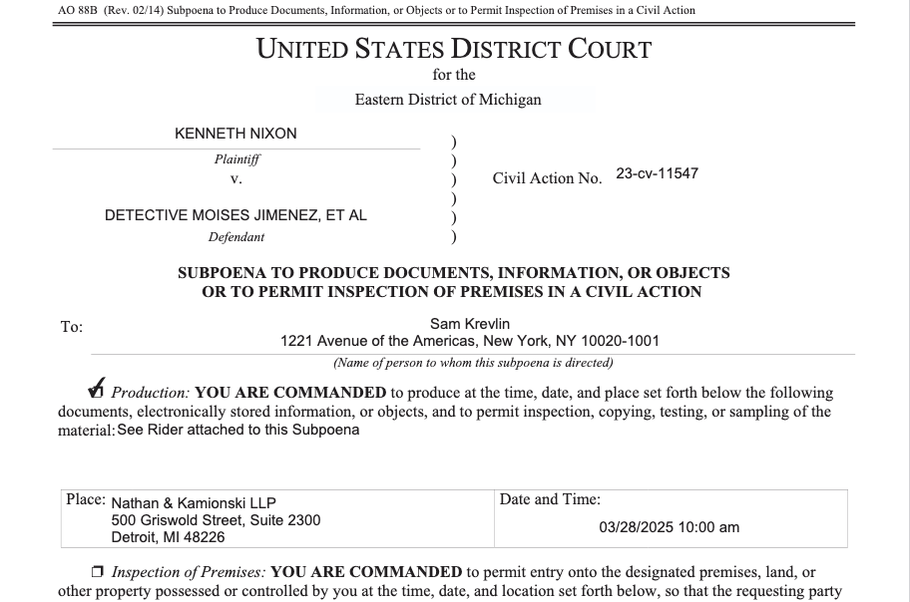Incident details
- Updated on
- Date of incident
- March 7, 2025
- Legal orders
-
-
subpoena
for
communications or work product
- March 7, 2025: Pending
- March 13, 2025: Objected to
- March 28, 2025: Ignored
- Sept. 19, 2025: Objected to
- Nov. 19, 2025: Quashed
-
subpoena
for
communications or work product
- Legal order target
- Journalist
- Legal order venue
- Federal
Subpoena/Legal Order

A portion of a March 7, 2025, subpoena issued to Sam Krevlin for newsgathering materials from his time as a student journalist working on Northwestern University’s Medill Innocence Project in Evanston, Illinois, in 2018.
Subpoena for student reporting in exoneration case struck down
A subpoena to former student journalist Sam Krevlin to turn over reporting materials on an exoneration case was struck down on Nov. 19, 2025, when a federal judge in a civil suit in Detroit, Michigan, ruled that Krevlin was protected from complying by journalist’s privilege.
A second subpoena for testimony was partially struck down, with the judge severely restricting the details Krevlin could be compelled to disclose about his journalistic work.
Krevlin was subpoenaed in connection with an investigation he conducted seven years earlier for the Medill Justice Project as an undergraduate at Northwestern University’s journalism school. Krevlin reported on Kenneth Nixon, incarcerated for a 2005 homicide, for an article published by the Detroit Free Press in October 2018.
Nixon was later exonerated and released, then sued members of Detroit’s police department in June 2023, alleging that they framed him. In turn, the defendants subpoenaed Krevlin in March 2025 for reporting materials on Nixon’s case and in August to testify in a deposition. Krevlin’s attorneys filed a motion to quash the subpoenas.
In November, U.S. District Judge Margaret Garnett partially granted the motion, quashing the document subpoena entirely and setting strict limits on the testimony Krevlin could be compelled to give.
Garnett ruled that Krevlin was protected by federal journalist’s privilege, and had waived that privilege only for the information he disclosed to an investigator for the county prosecutor’s Conviction Integrity Unit in 2020.
Former student journalist Sam Krevlin was subpoenaed in connection with a civil suit in Detroit, Michigan, on March 7, 2025, seeking his journalistic work product from his time at Northwestern University seven years earlier.
Krevlin, who did not respond to requests for comment, was a student at the university’s Medill School of Journalism in Evanston, Illinois, in 2018 when he was selected to participate in the Medill Justice Project, now known as the Medill Investigative Lab. According to court filings, he was assigned to be among the team reporting on Kenneth Nixon, who claimed he was innocent of the 2005 homicide for which he had been incarcerated.
The team’s reporting was published by the Detroit Free Press in October 2018. Nixon was exonerated and released from prison 16 months later, 16 years after his conviction.
In June 2023, Nixon filed a federal lawsuit with claims against the city of Detroit — which were later dismissed — and members of its police department, alleging that they framed him.
As part of pretrial discovery in that suit, the defendants sent Krevlin the March 2025 subpoena for his “entire case file”: email, letter or text communications with sources; interview recordings and transcripts; notes; and any documents received via public records requests.
Krevlin, who now lives in New York, objected to the request on March 13, asserting in part that it had been improperly served via email and violated both federal and state reporter’s shield laws. After initial communications in April, attorneys for the police defendants “went dark” and no efforts were made to enforce the subpoena, according to Krevlin’s attorneys.
Months later, attorneys for the defendants issued Krevlin a new subpoena, ordering him to sit for a deposition later that month. Krevlin’s attorneys raised objections to the request and filed an official motion to quash Sept. 3.
In a response filed two weeks later, attorneys for the defendants argued that Krevlin had waived his privilege by discussing his reporting with an investigator for the county prosecutor’s Conviction Integrity Unit in 2020. They also asked that the court order Krevlin to comply with both the deposition and production subpoenas.
Krevlin’s attorneys objected to that request Sept. 19, arguing that the information sought could be obtained from non-privileged sources; that the requested materials are in the possession of the university, not Krevlin; and that Nixon’s exoneration wasn’t solely on the basis of his reporting and interview with police informant Stanley January Jr.
“To the extent the Detroit Free Press Article was the catalyst to question the veracity of Mr. January’s testimony this does not make it the crux of the CIU’s recommendation to overturn Mr. Nixon’s conviction,” Krevlin’s attorneys wrote.
In October, attorneys for the defendants asked U.S. District Judge Margaret Garnett to set a date for oral arguments or to issue a ruling on Krevlin’s motion to quash, citing the ramifications the decision may have for their ongoing discovery efforts. As of publication, no such date or ruling has been entered.
The U.S. Press Freedom Tracker catalogs press freedom violations in the United States. Email tips to [email protected].